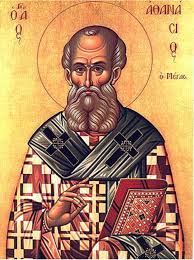HOMILY EASTER SEASON WEEK 05 04 – Year II
Abiding in Love:Memorial of St. Athanasius
(Acts 15.7-21; Ps 96; Jn 15.9-11)
**********************************************
When was the last time you told somebody you loved them? When was the last time someone said they loved you?
The answer to that last question is actually today – just now, in the gospel, where Jesus says, “As the Father has loved me, so I have loved you.” Jesus then goes on to invite us to abide in his love by keeping his commandments.
The message Jesus is giving us here is simple: Abide in his love and keep his commandments. That, above all, is what Jesus wants the apostles (and us) to be about after his ascension.
This is a very important message, because it is also Jesus’ last will and testament, knowing that he was about to die – “Jesus knew that his hour had come to depart from this world.” And when someone is on their deathbed or about to die, we pay close attention to their words.
Abiding in Jesus’ love is best done through prayer. A simple and classical definition of prayer is “lifting up our minds and hearts to God.” So, we can offer God whatever is in our thoughts and our emotions, pleasant or painful, in utter simplicity and total honesty. We can even share our anger at God if need be – God can certainly handle that, and as in human relationships, there is more love in sharing the truth than in withholding anything out of fear of hurting the other’s feelings.
Classically, prayer involves petition, thanksgiving, praise and adoration. All these ways of praying are ways of abiding in God’s love. However, once again, I would suggest the prayer of contemplation is one of the best ways to abide in God’s love. We do that with other loved ones in our lives already – just wordlessly sitting in each other’s presence, knowing and sensing the presence of the other, and that is enough. That is contemplative prayer when we do that with Jesus, truly abiding in his love and just soaking up that love in faith.
Abiding in the love of Jesus for us, as he did with the Father, provides us with a deep sense of security, that all is well with the world. That in turn gives us a sense of belonging to God, to the human race, to this earth. Next comes a sense of peace and order in our lives, no matter what kind of chaos or disorder might be raging around us. And finally, we can live lives of peace and joy, grounded as we are in the Father’s love through Jesus. That is why Jesus states at the end of today’s gospel, “so that my joy may be in you and that your joy may be complete.
The last part of Jesus’ last will and testament to us is to keep his commands. That too is quite simple. His will and his commandments can be summed up as follows: 1. Love God with our whole being, 2. Love our neighbor, 3. Love ourselves, 4. Love others as he has loved us, and 5. Love our enemies.
We are loving God now as we celebrate the Eucharist. We love others by trusting them, blessing them, affirming them and truly caring for them. We love ourselves when we accept ourselves as we are, forgive ourselves for our mistakes, and can accept compliments graciously. We love others as he loved us when we can sacrifice some of our own desires for the good of others. And we love our enemies best by forgiving them from the heart.
Val did an inner child workshop and took 12 Step retreat as part of her healing journey, dealing with some deep hurts from her mother. Finally, she dreamed that her mother was asking for forgiveness, and woke determined to do so, even if she didn’t feel like it. She phoned her mother and let her know she was forgiven. They cried over the phone and were reconciled. Val felt so good that she went to visit her grandmother, thanked her for always being there for her, and told her that she loved her. Her grandmother replied she loved her also and would always love her.
A few weeks later, her grandmother travelled to Edmonton to visit members of the family, and died there suddenly. Val was able to truly celebrate her funeral, because she could hang on to those words, “I will always love you.” How glad she was that she had taken the time to communicate her love to her grandmother, as well as to her mother through forgiveness. Val was living the gospel for today.

St. Athanasius
St. Athanasius whom the Church honors today is another model of faith lived well for us. Born at Alexandria in Egypt about 297, Athanasius is one of the Greek Fathers and a Doctor of the Church. He was present at the Council of Nicea (325), convened to oppose the Arian heresy, which denied the divinity of Christ. Bishop of Alexandria and spiritual head of the desert hermits and of Ethiopia, Athanasius was a brilliant and formidable defender of orthodoxy, incurring the wrath of a succession of non-Christian emperors who repeatedly forced him into exile. Athanasius wrote several outstanding treatises on Catholic doctrine, especially on the Incarnation, and introduced monasticism to the West. He died in 373. Through his example, his learning and his writings, he remains one of our greatest teachers.
The Eucharist is both an act of faith and also an experience of the love of Jesus, here and now, through word and sacrament.
May our celebration empower us to believe in Jesus more deeply, abide in him more closely, and love others as he has loved us.



